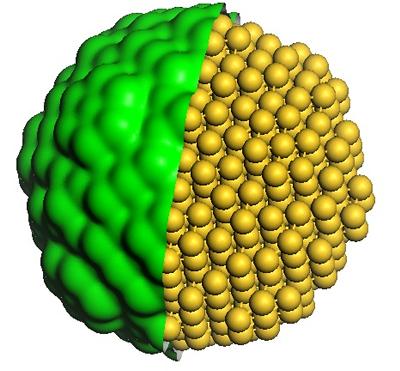Phd Studentship: Large-scale quantum simulations of chemical reactions on entire metal nanoparticles
Dr Chris-Kriton Skylaris School of Chemistry, University of Southampton
Supported nanoparticles of pure and alloyed metals play a central role in industrial catalysis and span processes as diverse as steam reforming, fuel cells and autocatalytic applications. Catalytically relevant nanoparticles consist of hundreds to thousands of atoms and have diameters in the 1-10 nm range.
However, conventional quantum chemistry approaches typically have the capability to model smaller clusters, no larger than about 1nm. Recent advances in quantum theory have led to a new generation of quantum chemistry methods, which are capable of optimal computational scaling and can tackle much larger nanoparticles. Of these, the ONETEP program is unique because it can achieve these length scales while retaining the same high level of accuracy as conventional ab initio quantum chemistry approaches. With this tool, for the first time we have the opportunity to model chemical reactions in the important nanoparticle size regime of 1-10nm where the transition from "bulk metal" to "nanoparticle" occurs.
This project will make use of a variety of state-of-the-art simulation techniques to model technologically critical materials. Through use of the ONETEP code the physical properties of both pure and alloy nanoparticles will be studied and correlated with calculations of the adsorption and reaction of catalytically relevant molecules. Particularly at the early stages, but also throughout the project, extensive validation will be made by comparing with the significant body of literature that exists on slab simulations and experiments.
This is a prestigious 42 month EPSRC CASE PhD studentship which is supported by Johnson Matthey who will enhance its tax-free stipend and will provide periods of placement within the company's research laboratories. The project will be jointly supervised by Dr Chris-Kriton Skylaris and Johnson Matthey scientists. Further details regarding research themes and projects within the Skylaris group can be found at https://www.southampton.ac.uk/chemistry/about/staff/cks.page. The successful applicant will join a well-established Research Group in the area of computational chemistry with a keen focus on the development of methods for large-scale quantum mechanical calculations and their applications and will have access to state-of-the-art supercomputing facilities and the latest developments in the ONETEP package (www.onetep.org). He/She will also be a member of the Computational Systems Chemistry section.
Applicants should have a good (preferably first or 2:1) degree in Chemistry, Physics or related subject and a keen interest in computational chemistry. For further details please contact Dr Chris-Kriton Skylaris (c.skylaris@soton.ac.uk).
The student eligibility conditions set by EPSRC for this studentship are available here: http://www.epsrc.ac.uk/funding/students/Pages/eligibility.aspx
